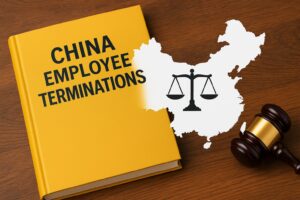Neither ChatGPT nor Google Are Attorneys
Many people turn to the internet for answers, including to legal questions. Though online resources regarding the law can be a great starting point, but relying solely on them for business decisions can be disastrous.
This post explores the limitations of the internet and AI in legal matters, and offers guidelines for safely using online legal information.
The Internet and AI Are NOT Always Reliable
Many years ago, a company (and its lawyer) called me in a panic. They had just learned that the $5 million in equipment they had purchased and sent to China would not count towards the $5 million the Chinese government required them to send as their minimum capital requirement. They had read online that the cost of equipment could count towards a company’s minimum capital requirement, but it had never occurred to them that this could only be the case if they had prior Chinese government approval, which they had never secured. The Chinese government was now requiring them to pay $5 million in cash, and they simply did not have sufficient funds to do so.
There was nothing anyone could do for them.
Why AI is Not Enough
I regularly use the internet and AI for legal research and beyond. I’m an avid user of AI, with a monthly subscription to Chat GPT, which I use alongside Google’s Gemini. I often start my legal research with a Google search. However, there is a reason why our law firm (and every other serious law firm) spends thousands of dollars every month on specialized legal research services.
Despite my frequent usage, I remain skeptical. Here’s why.
The Information on this Blog May Not Suit Your Unique Circumstances
We continually emphasize not using this blog as a replacement for professional advice. Our disclaimer states: The purpose of the Websites is to provide general information only. The Websites are intended for communication purposes, not for solicitation to provide legal services. The information on the Websites does not constitute or contain formal legal advice or solicitation of legal services.
Many of our posts will use modifiers to emphasize that what we are saying is generally true, but not always. Still, I frequently hear about people acting based solely on one of our blog posts.
A reader once wrote asking if his business situation would cause the Chinese government to deem him to be doing business in China. I responded by saying there was no way I could answer his question:
Much of what you say is not at clear to me and I would need to know considerably more to know whether what you are proposing is legal or not, and then we would want to confirm that with the local Chinese government authorities and maybe bring in a China accountant for some related issues.
Just imagine if on the sketchiest of facts, I were to tell you that everything you are doing is okay and then you get jailed because it actually is not. See Doing Business in China Without a WFOE: Will the Defendant Please Rise.
This reminds me of when I got an email from someone who said that people on WeChat were claiming our blog had said foreigners need to submit some strange form to the Chinese government, when we absolutely never said such a thing nor were we even aware of such a thing.
I told this person the following (which is actually now one of my email response templates!):
You should never make a legal decision based on what you read on the internet.
I spent nearly a year living in Spain (working and getting to know my law firm’s Spain lawyers). Before going to Spain, I read everything I could on Spain visas, but I knew I still didn’t know enough to do it on my own. I worked with a Spain immigration lawyer and in about three hours she set me straight by letting me know exactly what I needed to do, and I did it and it worked.
Ninety percent of what I had read about Spain visas on the internet was accurate, but ten percent was either wrong or had recently changed or did not apply to my specific situation. Had I gone with just what I had learned on the internet, I would have violated Spain law, and I would likely have been booted out of Spain in 90 days.
Despite all that I learned by going through this Spain visa process, when another American lawyer in my firm went to Spain a few years later, he too went to this same Spain immigration lawyer, and he reported back that she had saved him huge amounts of time and huge amounts of problems and that not everything I had done would have been best for him and his wife both because the laws had changed and because their situation was not exactly the same as mine had been.
Laws are Dynamic and Local, and They Can Be Lost in Translation
I often find myself telling clients that I am 90 percent certain we will tell them to do something a particular way, but we need to do our research first to make certain this is actually the case. Our need to research is because of the following:
1. Laws are Often Localized: Laws can and do vary regionally within countries. As just one obvious example, employment laws frequently vary city by city, even within the same country. New York’s employment laws are not the same as Tulsa’s, Shanghai’s are not the same as Qingdao’s, Monterrey’s are not the same as Mexico City’s, Sydney’s are not the same as Melbourne’s, and Madrid’s are not the same as Barcelona’s.
2. Written Law vs. Actual Enforcement: The law on paper often differs from the law as enforced. This is particularly true in emerging market countries. Our lawyers often cross-check with local governments to ensure we’re on the right track. I am always telling our clients that there is a big difference between the IP protection China gives to rubber ducky technology versus high end semiconductor technology, and so the legal work to protect one might be very different than the legal work that to protect the other.
3. Language Barriers: Chinese laws are in Chinese. Mexican laws are in Spanish. Vietnam laws are in Vietnamese. Online translations can range from misleading to passable. Relying solely on them is incredibly risky. See Why English Translations Of Chinese Laws are Not a Good Idea.
I recently was speaking with a client looking to move its manufacturing from China to Mexico and I said that in doing so, they needed to be sure that whatever his company would make in Mexico would be deemed to have been Made in Mexico for US Customs tariff purposes. They sought to assure me that would be no problem because just over 70 percent of the weight of their product was comprised of Mexican parts.
Despite what they’d “read on the internet”, there is no 70 percent rule, and so I connected them to one of our international trade lawyers to ensure that whatever they have made in Mexico will not be subject to the China tariffs, or if that isn’t possible, they at least understand what their tariff costs will actually be.
AI Isn’t Infallible
AI is useful for preliminary legal inquiries. However, they have limitations.
A few months ago, I was giving a big speech on China investment risks. An hour or so before it I realized that it would be nice to know about U.S. case law involving a particular China legal issue. I asked AI for a case on this tiny legal issue and two of them gave what I thought were pretty good answers. But I was wary, so I asked both to give me the cases that supported the propositions they were espousing. Every single case was completely fictitious. As a lawyer I was able to quickly determine the cases were fake. But let this be a warning.
AI Lacks Critical Thinking and Judgment
Though I constnatly describe AI as “amazing”, it lacks the critical thinking and judgment skills necessary for complex legal tasks. Legal issues are rarely black and white. They usually require analyzing intricate situations, weighing potential outcomes, and making strategic decisions based on incomplete information. In these scenarios, human lawyers excel. We can sift through complex legal precedents, identify relevant factors, and apply our experience and judgment to formulate the best course of action for our clients.
AI Can’t Navigate the Complexities of Legal Proceedings
The legal system is a labyrinth of intricate procedures, rules, and unforeseen challenges. Successfully navigating a lawsuit, contract negotiation, or other legal proceeding requires understanding the legal landscape, the personalities involved, and the ability to adapt to unexpected circumstances. Though AI can process vast amounts of data, it lacks the fluidity and adaptability required in legal proceedings. AI can’t anticipate unexpected arguments from opposing counsel, adjust strategies on the fly, or make crucial decisions in the courtroom based on real-time developments.
AI Doesn’t Build Relationships or Understand Client Needs
The lawyer-client relationship is built on trust and a deep understanding of the client’s specific needs and goals. A skilled lawyer can build rapport with their client, actively listen to their concerns, and develop a personalized legal strategy that addresses their unique situation.
Just this weekend, I convinced a client who was really angry with its Chinese factory not to write an email until his company was completely certain that it had lined up another supplier. I was concerned that the Chinese factory would respond to the email by cutting off all product supply, which would greatly damage my client. AI would have done a great job revising his letter, but would never have told him not to send it.
AI does not establish a human connection or comprehend the emotional aspects of a legal case. It treats legal problems as purely data-driven exercises, missing the crucial human element that is so vital in effective legal representation.
Guidelines for Responsibly Using Online Resources
The internet and AI can provide you valuable insights, but they also come with inherent risks, especially when seeking legal guidance for your business. Here’s some advice for safely navigating these resources:
1. Always Question Online Legal Information: Avoid treating it as definitive.
2. Double-Check Laws: Before making decisions, ensure you have the latest and most accurate legal information. This is oftentimes considerably more difficult than people realize and sometimes it is not even possible to do on the Internet.
3. Ensure Relevance to Your Context: Confirm that the laws or guidelines you think pertain to your specific situation actually do. By way of one common example, at least 40 percent of the time when companies contact us to draft them an NNN Agreement to protect their IP, we tell them that such an agreement would be a complete waste of their money.
4. Trust Your Judgment: If something online seems too simple or doesn’t make sense, you are probably right.
5. Weigh the Stakes: Using online advice for minor disputes, like contesting a parking ticket, is probably fine. But for larger financial decisions, you should always consult a professional. It just is not wise to spend big money based on solely online information.
Conclusion
Be very careful basing your business or legal decisions solely on internet resources.
Though these resources can give you a preliminary understanding of issues (as I found with my Spain visa research), their scope should be limited. The internet and AI can save you both time money, but substituting them for expert legal counsel poses severe, yet preventable risks.

























